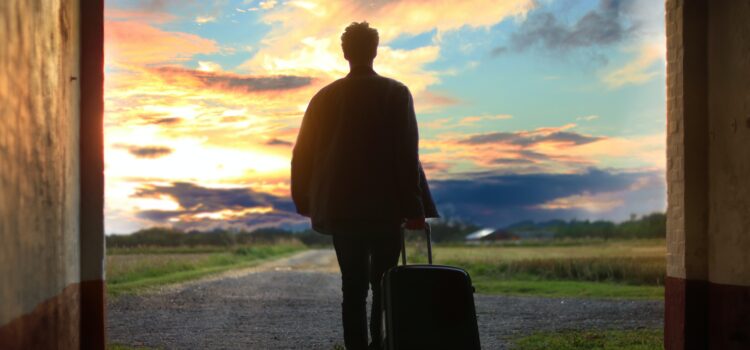

This article gives you a glimpse of what you can learn with Shortform. Shortform has the world’s best guides to 1000+ nonfiction books, plus other resources to help you accelerate your learning.
Want to learn faster and get smarter? Sign up for a free trial here .
Why is traveling so important? Can taking time to travel actually boost your career? What are the health benefits of traveling?
When you travel, it’s much more than a vacation. Traveling can make you happier, make you grow as a person, improve job performance, and so much more. But sadly, so many people just don’t do it.
Here’s why traveling is important and how it can change your life.
The Top 10 Benefits of Traveling
If you have unused vacation time, consider making full use of it—and that doesn’t mean taking a “staycation” or taking yet another trip to Disney. Go to a country you’ve never been to before, eat foods you’ve never heard of, meet people from other parts of the world, and become a better person for it.
Here are ten reasons why traveling is important, according to science.
1. Traveling Boosts Happiness and Lowers Depression
If you’re feeling depressed, there may be a natural way to reduce your symptoms. Yes, travel has been scientifically proven to decrease rates of depression and increase happiness. The main factor is that the more day-to-day changes you see in scenery, the happier you are. This result could be achieved by both domestic and international travel.
Believe it or not, it’s not just the act of traveling, but even the act of planning and anticipating a trip that makes you happier. So, if you’re starting to feel down, ask yourself when the last time you had a change of scenery was, because you might be overdue.
2. Traveling Releases Stress
In addition to boosting happiness, traveling also reduces stress. One study found that taking short vacations (such as a long weekend getaway) can dramatically reduce your stress levels, and the effects can last for months after the vacation ends. So even if you don’t have the vacation time or the money to take an extended trip, make sure you take advantage of long weekends to get away from your daily routine.
3. Traveling Reduces Job Burnout
According to a study done by Indeed, over half of workers surveyed said they were feeling the effects of burnout. Some signs of burnout include excess tiredness, lack of motivation, and the inability to stay focused. In the long run, these symptoms could also negatively affect your job.
The effects of burnout have been especially bad since the start of the pandemic and the increase in the number of employees working from home. LeeHealth.org says that working from home blurs the line between work and home and makes it more difficult to leave your work at the office. And on top of everything else, the lack of change in scenery can make it feel like the days just blend together. The healthiest solution to all of these problems is to travel.
Traveling is important because it’s a way to recharge your batteries, get a dramatic change of scenery, and find more meaning in your life. And when you return to work, you’re likely to feel more energized, motivated, and creative.
4. Traveling Increases Your Creativity
Speaking of creativity, that brings us to number four on the list of why traveling is important. According to a study published in Tourism Management, travel is scientifically proven to make you more creative. For this study, workers were tested before and after going on a trip, and when they returned, their cognitive flexibility improved. This means that they could think of more diverse ways to use commonplace items and their unconventional problem-solving skills increased.
One psychologist wrote in the Harvard Business Review that he takes these results so seriously he even integrates them into his interview process when hiring. So, rather than hurting your job, taking a vacation can improve your performance and make you a more valuable employee.
5. Traveling Increases Emotional Agility
Some people use their vacation time to travel to the same comfortable destinations every year (e.g. Florida, a family cabin, a shared vacation home, etc). However, rather than staying in your comfort zone, you should be actively trying to push yourself out of it. By exposing yourself to totally new experiences and cultures, you increase your emotional agility. This increases your ability to adapt in difficult situations, accept discomfort, and navigate society.
On top of emotional agility, traveling often and to new places increases your mental resilience. Facing and overcoming challenges in unfamiliar places pushes you out of your comfort zone and forces you to rely on yourself and to use your problem-solving abilities. Experience this enough times, and you’ll be able to handle whatever life throws at you.
6. Traveling Makes You Reconsider Your Perspective
When you travel to another country, you’re often forced into trying new things—whether that be new foods, experiences, or even modes of transportation. While getting out of your comfort zone may be scary at first, you might just discover your new favorite activity. For example, I’m a very uncoordinated person and tend to stay away from anything that requires me to balance. But after trying a surf lesson in Costa Rica, I realized that not only was I able to ride waves, but I really enjoyed it.
International travel also makes you look at your own culture differently when you return home. I remember when I went to Japan, I was shocked at how tiny their portion sizes were (especially the drink sizes)! But after getting used to it, I came back to the U.S. and was shocked when I saw people holding to-go soda cups that were almost a foot tall. Sure, those cups have been around me my entire life, but it’s not something I ever paid attention to before. After that, I started mindfully choosing smaller drink sizes. It’s good to look at your culture from a different perspective every now and then and question things that you considered normal before.
7. Traveling Introduces You to New Foods/Drinks
While some places will give you the option of having the local meal or the “Western-style” meal when traveling abroad, that’s not always the case. Many times when you travel abroad, you won’t recognize the meals, or if you do, you’re used to the Westernized version of the plate. This can be intimidating at first, especially if you’re not an adventurous eater. But if you do choose to get the local dish then you’ll often be rewarded with a special experience. And if you don’t like it, at least you can say you tried it. Who knows, you may even discover your new favorite food or an ingredient you didn’t even know existed.
When I was in Thailand, the owner of a bungalow I was staying in prepared a special dinner. When she came out, she served me a giant fish on a plate, eyes and all. I don’t normally even eat seafood, but I wasn’t going to turn down a home-cooked meal. The fish turned out to be juicy and flavorful, especially paired with the selection of vegetables she prepared. I can’t say that I now make head-on fish at home, but I do cherish the memory of that bungalow dinner.
8. Traveling Can Make You Friends
Traveling allows you to meet new people from all walks of life. When you’re taking a trip, odds are that the other travelers you run into are likely to be a lot friendlier and more open to talking than someone you’d run into on the train to work—they’re less burdened by the everyday stressors and more relaxed. You could meet your new best friend, a potential business opportunity, or even a future significant other.
The connections you build while traveling are often stronger than previous connections you’ve made because you already have one huge thing in common: You’re both pursuing your shared dreams of traveling.
Whether you ever speak to the friends you make on your journeys again or not, it doesn’t matter. What matters is the ability to build genuine connections with diverse people from around the world who give you new perspectives.
9. Traveling Makes You Grow as a Person
There’s no other experience that can open your eyes to how small you are in the world like traveling can. When you start to see how other people in the world live, it shifts your perspective on your own life. This could be as simple as trying to adapt your work attitude after being inspired by the Japanese work ethic, or as dramatic as wanting to volunteer or join the Peace Corps after witnessing starving families in a struggling country.
In addition to broadening your perspective, traveling can have a more personal impact as well. Many people, once they reach adulthood, fall into a fixed mindset, becoming resistant to change and trying new things. Traveling, on the other hand, promotes a growth mindset—this means you’re more open to learning new things, you’re willing to take on challenges, you can accept your flaws and grow from them, and you’re more likely to become successful because you’re not afraid of hard work. All of those skills can help you in both your personal and professional life.
Finally, traveling is important because it teaches you to be more present in your life. When you travel with little or no itinerary, you’re forced to be immersed in the moment. Rather than filling your days with tours and schedules, try leaving some time open. You may find that riding a scooter aimlessly in the mountains of Thailand was more magical than touring Bangkok’s Grand Palace. When you return home, you may start to notice and appreciate the little things around you that you never paid attention to before.
10. Traveling Makes You Brave
Whether or not you plan to take risks when you travel, it often ends up happening anyway. You may be put in risky situations by mistake, such as getting in a sketchy cab, staying in a questionable hostel, or getting on the wrong train. Or you might walk into risky situations on purpose, like going bungee jumping, trying to communicate in a foreign language, or eating a poisonous fish. Whatever the reason, you’re much more likely to face scary situations when traveling than when you’re at home. These experiences force you to face your fears and insecurities and make you a stronger and braver person. If you decide to travel more or for longer periods, you may not even recognize the person who initially set out on the journey.
Final Thoughts
Traveling is important for so many reasons. However, you may think you’re too old to travel, or you can’t travel with kids, or traveling is crazy-expensive. All of those things are myths. You can—and should—take that leap of faith and push yourself out of your comfort zone. If for some reason you decide that traveling isn’t for you, then you don’t need to do it again. But odds are, you’ll catch the travel bug.

Want to fast-track your learning? With Shortform, you’ll gain insights you won't find anywhere else .
Here's what you’ll get when you sign up for Shortform :
- Complicated ideas explained in simple and concise ways
- Smart analysis that connects what you’re reading to other key concepts
- Writing with zero fluff because we know how important your time is






